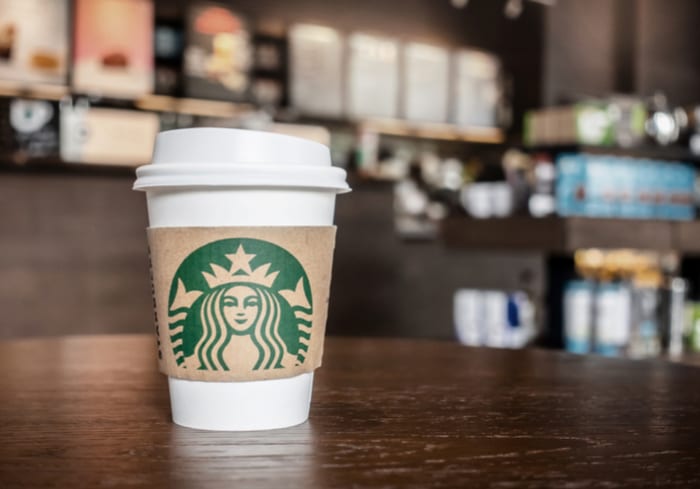Starbucks Mobile App Now Counts 16.8M Users

With the growth of its rewards program and its stock reaching a record high ahead of expected earnings, Starbucks beat analysts’ earnings estimates and fell slightly below revenue expectations for the second quarter of its fiscal 2019. The coffee quick-service restaurant (QSR) chain reported revenues of $6.31 billion and earnings per share of 60 cents compared to analysts’ estimates of $6.32 billion and 56 cents.
Starbucks President and CEO Kevin Johnson pointed out the continued momentum of the company’s mobile app rewards program in its earnings call. During the second quarter, the company expanded its active member base by half a million customers — a 13 percent increase — and took the ranks of its active mobile app rewards membership to 16.8 million. At the same time, he noted that the momentum had a positive impact on results, with members of the program accounting for 41 percent of sales in U.S. stores over the quarter.
Johnson also said that the company was pleased with the smooth rollout of its enhanced loyalty offering, which gives diners “greater choice and flexibility in redeeming rewards.” The offering, as PYMNTS previously reported, includes redemption options such as 25 stars for a dairy substitute, espresso shot or additional flavor. Customers could also redeem 50 stars for a brewed hot coffee, hot tea, or bakery item, among other options.
The company also expanded its Starbucks delivers program in the quarter to almost 1,600 stores across seven major markets in the United States. Johnson noted that the program is still in the early days, and its main focus is to bring in customer awareness that leads to trial and adoption of the channel. The approach lets the company “refine the program as it grows” to ensure a solid customer experience. “We remain excited about the potential of delivery,” Johnson said, adding that it would update its progress in the quarters to come.
Store Experiences And Beverage Platforms
Johnson also pointed out that the company is working to enhance the experience in its stores, which involves cultivating customer connections and best moments that “keep customers coming back time and time again.” He noted that the company saw ongoing improvement in its customer connection scores during the quarter, which is fueled by the actions the company is taking to help store partners better connect with customers. At the same time, he said that delivering beverage innovation paid off during the quarter.
The company saw continued momentum in its cold beverage platforms throughout multiple parts of the day, according to Johnson. He also noted that the company’s cloud macchiato rolled out in March to “great success.” He also noted that the company crossed the 50 percent mark for the deployment of its nitro cold brew in its U.S. company-operated stores during the quarter. He also said that the company was on course to reach a goal of 100 percent deployment by the close of fiscal 2019. At the same time, he noted that there was a strong plan for beverage innovation in the summer with products that could address seasonal taste preferences of customers.
The Road Ahead In China
China, Johnson said, delivered 3 percent comp sales growth for the quarter — up from 1 percent in the first quarter with meaningful improvement in traffic comps. Johnson said that the results were significant with the “intensity of competition from discounting in China as well as our aggressive pace of new store development.” The company opened 553 net new stores over the last 12 months, representing a 17 percent annual growth rate. Its goal is to have 6,000 stores in fiscal 2022.
Johnson said the company’s leadership is backed by “brand strength and operating results” — key competitive advantage points in China. He said that the company wins because of the premium quality of its coffee as well as its handcrafted beverages, the third place (defined by Brookings as a place between home and work) created in its stores, and the emotional connection partners forge with their customers. He also noted that the company successfully rolled out Starbucks delivery partnerships with Alibaba to over 2,100 stores and more than 35 cities throughout China.
While the program is still in its launch phase, he said the effort’s performance to date meets expectations. Average delivery time is under 20 minutes, and there is a strong trial from existing members of its rewards program. “This gives us confidence that we’re building a meaningful and sustainable delivery channel to complement our existing in-store experience,” Johnson said.